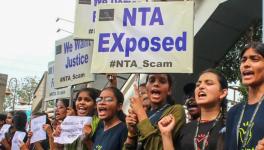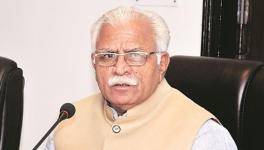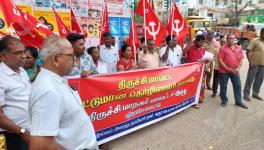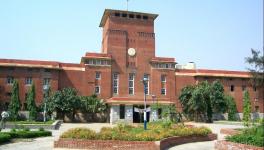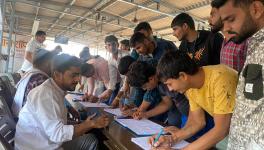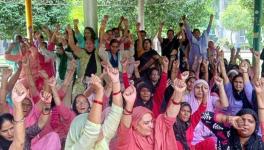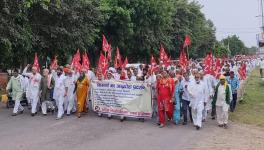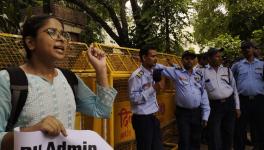New MBBS Fee Policy in Haryana Shatters Dreams of Poor, Marginalised Aspirants
The Haryana Government, in its notification released on October 29, stated that the aspirants seeking admission in the medical colleges funded by it will have to furnish a bond of Rs 10 lakh per annum. Similarly, it also introduced a fresh hike in fee from Rs 56,000 to Rs 80,000 per annum to increase progressively at the rate of 10% per annum. The changes will bring the cost of the government-funded MBBS course to around Rs 45 lakh.
The argument for bringing the bonds advanced by the state government officials is that the students will be inspired to continue their services with government hospitals. The state government reportedly said that the EMIs of bond loans will be paid by the government if students render their services for seven years to its hospitals after one year of mandatory internship. The proceeds from the fee will be reportedly diverted to a trust which will spend it on the development of health infrastructure in the state.
However, the question that arises is, will Haryana, which arguably performs much worse in national health indicators, be able to ramp up its facilities to meet the national average? Doctors and public health experts that NewsClick spoke with expressed their wariness regarding the move and its intended action.
Dr Ranbir Singh Dahiya, retired Professor from PGIMS Rohtak, suggests that the policy is incoherent with the needs of the state and it will further deepen the crisis of specialist doctors in the state. A core team member of the Jan Swasthya Abhiyan in Haryana, Dahiya told NewsClick, “The policy prohibits the MBBS graduates from pursuing specialisation courses like MD and MS. Now, as per the guidelines of the central government, every community health centre should have one surgeon, physician, paediatrician, gynaecologist and preferably anaesthesiologist. If you do not allow these graduates to pursue specialisation, how will it fill its vacancies in community health centres (CHCs). Even if the students want to go for specialisation, they must pay the whole amount.”
“Second, the time period for service suggested by it can kill the aspirations for a specialist. The tenure of seven years is too long to remain in touch with studies and pass the entrance examinations for these courses. We do not see any instances of the proposed system in any other state. Essentially, it will lead to privatisation of medical education,” he added.
Also read: Haryana Polls: Protesting Medical Students in Jhajjar Set To Challenge BJP’s ‘Arrogance’
Citing the data, he further said that the state currently has 63 hospitals, 127 CHCs, 511 primary health centres, 64 dispensaries and 2636 sub health centres. He emphasised that the state needs more health facilities to serve the population. He went on to add, “The provisional population of the state currently is 2,98,08,027. For accommodating this population, we need 298 CHCs, 993 PHCs and 5,961 sub health centres.”
As per the data of National Family Health Survey, Haryana has been constantly underperforming on national indicators of health. The survey notes that the Infant Mortality Rate in the state in 2005-06 was 42 which reduced to 33 in 2015-16. The decline registered was 21.42%, much lesser than the national average of 28%.
The survey further found that anaemia was prevalent in children and pregnant women in the state. As per data, 71.7% children in the age group of 0-5, 62.7% in the age group of 15-19, and 55% of pregnant women in the age group of 15-49 were anaemic.
Dahiya further argued that the government will not be able to absorb the doctors graduating from medical colleges until it creates the much needed primary and secondary health infrastructure. As per the data furnished by state government in reply to an RTI, the state had only 78 and 418 vacancies for Deputy Civil Surgeons and Medical officers in its hospitals in 2015.
Dr Harjit Singh Bhatti, Senior Geriatrician and National President of the Progressive Medicos and Scientists’ Forum, is of the opinion that the worst victims of the new system will be students from marginalised sections, particularly Scheduled Castes and Scheduled Tribes who look at the government medical colleges as last resort for affordable medical education.
Talking to NewsClick about the possible effects, Bhatti said, “I think the government has brought three catastrophes with the new system. One, it deprives the poor students of their dreams of becoming a doctor. Second, the system is akin to slavery where students will be entirely dependent on the mercy of government if they wish to become doctors and third, it eliminates the possibilities of any future income.”
Pointing out the need for more government investent on infrastructure, he said, “The argument that is being advanced by the government officials is all but preposterous. They are saying that they will form a trust where the money will be kept for the development of medical infrastructure in the state. The historical experience suggests that you need dedicated investment out of Gross Domestic Product (GDP) to build the infrastructure. At present, we need at least 6 to 8% percent of GDP but the government have been running away from any commitment on it.”
Not only that, he added, “As far as poor students are concerned, the fee hike is likely to result into more dropouts because the same notification does not guarantee that it will absorb all students finishing education from medical college.”
Bhatti also lashed out at the pro-corporate policies of subsequent governments which have resulted in proliferation of private medical facilities across the country. He said, “Another argument that is being advanced is that doctors abandon government hospitals to serve in the private sector. That’s correct but it must also explain why did it happen? It is precisely the result of pro-corporate policies that it has been pursuing in the medical sector.”
“Ninety percent beds and specialisations are today in private sector. Now, they want a specialist doctor to hand out paracetamol at a primary health centre which does not have access to roads, water and in some cases electricity too. But the doctor would want their skills to be better used,” he added.
Also read: Countrywide Doctors, Students Protest Against NMC Bill
Get the latest reports & analysis with people's perspective on Protests, movements & deep analytical videos, discussions of the current affairs in your Telegram app. Subscribe to NewsClick's Telegram channel & get Real-Time updates on stories, as they get published on our website.









